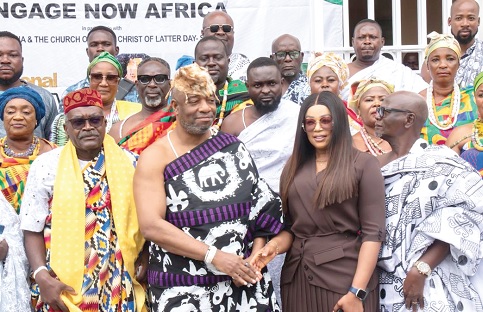The Ga Mantse, Nii Tackie Teiko Tsuru II, has called for a shift towards practical literacy that not only promotes reading and writing but also preserves the county’s identity and creates jobs.
He stressed that literacy should be relevant to the realities of today by equipping citizens with digital skills to thrive in a fast-changing world.
The Ga Mantse was speaking at the commemoration of International Literacy Day 2025 in Accra last Monday.
“Literacy must be practical. Reading that opens doors, writing that sparks innovation and digital skills that leads to jobs.
No child, no farmer, no trader anywhere in Ghana should be left behind,” he said.
Literacy Day
International Literacy Day, observed globally on September 8 since 1967, emphasises literacy as a human right and driver of development. In Ghana, 7.9 million people, including 4.6 million women, remain illiterate.
Despite the progress, gender and regional disparities persist, highlighting the urgent need for inclusive, practical literacy in the digital era.
The event, organised by a non-governmental organisation (NGO), Engage Now Africa, sought to raise awareness about the challenges millions of people still face in accessing basic reading and writing skills.
It emphasised literacy’s vital role in empowering individuals, reducing poverty, promoting gender equality and building sustainable societies.
Significance
The Ga Mantse further stated that illiteracy now meant double exclusion—both from traditional education and the digital age.
He said literacy went beyond letters on a page, serving as a means to safeguard traditions, transmit history and empower the next generation.
Nii Tackie Teiko Tsuru II urged parents, teachers, leaders and traditional authorities to embrace technology as a bridge, not a threat, while ensuring that no child, farmer, or trader was left behind.
The Paramount Queen for Youth and Children of the Ga State, NyeAwo Naa Ayele Nobaatse I, urged authorities to redefine literacy in line with its unique challenges and prioritise fixing the country’s broken education system.
She echoed the Ga Mantse’s sentiments and stressed that true literacy must go beyond reading and writing to include critical thinking, digital responsibility and national development.
NyeAwo Naa Ayele Nobaatse I further lamented persistent shortages of teachers, overcrowded classrooms, inadequate funding and untrained staff in public schools, describing the system as “sad and heartbreaking.” She, therefore, called for honest dialogue, intentional planning and sustained investment.
Digital inclusion
The African Director and Ghana Country Director of Engage Now Africa, Cecilia Amankwah, underscored the urgent need to strengthen literacy as a foundation for digital inclusion and socio-economic development.
She enumerated persistent challenges such as low internet penetration, unequal access to digital tools, and the setbacks caused by COVID-19.
She revealed that since its inception, Engage Now Africa had enrolled over 20,000 learners, graduated 15,000, and provided skills training to more than 10,000 Ghanaians.
Ms Amankwah called for stronger partnerships with government, NGOs and international bodies to transform literacy nationwide.
The Secretary-General of the Ghana Commission for UNESCO, Dr Osman Tahidu Damba, in a speech read on his behalf, stressed the need to bridge the country’s digital divide to make literacy meaningful in the modern era.
He described literacy as the foundation of empowerment and sustainable development, but lamented how many rural schools still lacked internet access while high data costs hindered low-income families.
Dr Damba, however, highlighted national efforts, including digital libraries, distance learning platforms and ICT policy reforms, but emphasised that more must be done.
He called for lifelong learning systems that would integrate digital fluency, creativity and problem-solving.

